More recently, the word "cloud" meant a well-known natural phenomenon, and only a few of the advanced users used this online service. Today it is hardly possible to surprise anyone with this technology. Where this service came from, its pros and cons, and what are the best today - I'll tell you now.
History of creation. Nobody knows whether this is true or just another romantic PR move, but for the creation of the first cloud service, we should be grateful to the Dropbox developer, who went on a business trip and forgot a flash drive at home. So the idea of \u200b\u200bthe first cloud arose, without which it is now difficult to imagine our life and work. After a while, all the leading companies, including Google and Microsoft, decided to implement the idea. And ten years later, this is a separate and seriously developed direction in the IT industry.
Pros and Cons of Cloud Services
The service is extremely convenient and has become a part of our everyday life. It allows you to keep files deleted, and I'm not afraid to lose them if my computer breaks down. The ability to use programs without installing them on a laptop allows me to unload the power of my computer. But let's look at all this in more detail.
Pros:
Protection of information from loss. Probably it main reason the popularity of the cloud. PCs and laptops are not always reliable, and I don't really want to lose my photo archive or important information.
Availability. Today, the cloud can be accessed from any device, if the Internet is available.
24/7 access to important information... Anyone who is involved in working with documentation will understand me one hundred percent. Sending the desired report from anywhere directly from your phone eliminates many problems.
Compatible with any operating system. I no longer depend on the version of the operating system, on additional programs, etc. Any computer and browser are enough.
The load on the PC is reduced. Many programs are already processed on a remote server.
Convenience of group work. It will always be available on the Internet latest version document and I can customize the access level for each employee.
Free service for working with documentation. A prime example, Google Docs, allows me to work comfortably with text files and not be afraid of compatibility issues.
The ability to use cloud servers to host sites on them.
Minuses.
Constant presence online, but considering that today almost every person has the Internet in mobile phone, it's not a big problem.
Decrease in speed due to weak data transmission channel.
Free solutions cannot always replace a paid analogue.
Safety. I think if the information is extremely important for a financial or confidential reason, then there are other solutions for this.
Top 5 best cloud services
Today it is difficult for me to choose the best cloud services, as their number is huge, and each of them is trying to get ahead. Let's consider the main ones, which are famous for reliability and quality.
We get 15 Gb for free. (changes and promotions are possible)
Paid expansion up to 30 TB
Storage of 30 types various files
The application works with text files, presentations and tables.
Work on one document is possible for several people.
The client works with almost all operating systems and gadgets.

We get from 2 Gb to 48 Gb for free. To achieve maximum volume, you need to carry out a number of actions. (changes and promotions are possible)
The ability to return important data within 30 days.
Fast rate of change when synchronizing.
Work with all operating systems and phones.
Work in a corporate mode is thought out as much as possible.

To start, I got 10 Gb for free, plus an additional increase for certain actions inside the storage. (changes and promotions are possible)
Maximum integration with mail.
Interaction with Microsoft Office 2013.
Synchronization with phone cameras.

25 Gb of free space. (changes and promotions are possible)
Synchronization with phone cameras
Work through clients not only for Windows, Mac OS, Android, iOS, but also for Linux.
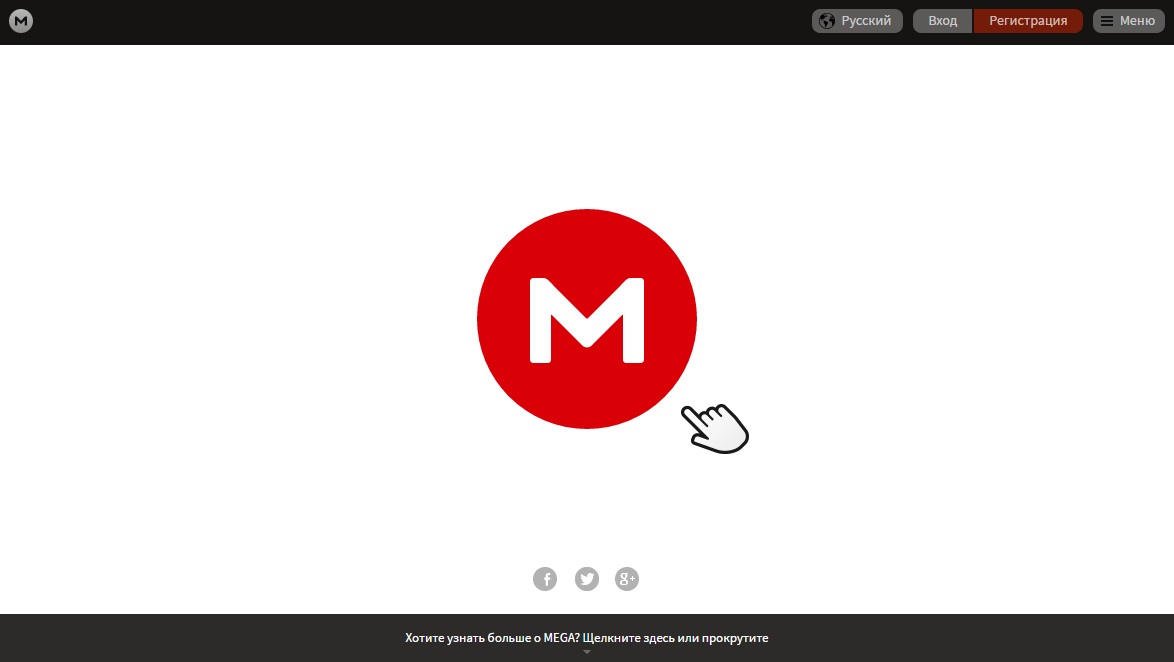
The service provides 50 Gb of free space and this is a record. (changes and promotions are possible)
Maximum protection, all information is encrypted using the AES algorithm.
Keys are transferred to the Friend-to-Friend principle.
Works with all operating systems.
There is no limit on the size of the transferred file.
This is not the whole list of useful cloud services, and I hope one day this technology will completely change our understanding of working with information and computers.
To exchange files between computers and mobile gadgets, you no longer need cables and flash drives. If devices have Internet access, files can “fly” between them “on the cloud”. More precisely, they can "settle" in the cloud storage, which is a collection of servers scattered around the world (combined into one virtual - cloud server), where users place their data for free or for free. In the cloud, files are stored in the same way as on a computer hard drive, but they are accessible not from one, but from different deviceswho are able to connect to it.
Every second or third Internet user has already adopted the cloud storage technology and uses it with pleasure, but someone is still saving themselves with flash drives. After all, not everyone knows about such an opportunity, and some simply cannot decide which service to choose and how to use it. Well, let's figure it out together.
What are cloud storage from the user's point of view and how they work
If you look through the eyes of an inexperienced user, cloud storage Is a common application. All it does is create a folder on the computer under its own name. But not simple. Everything that you put in it is simultaneously copied to the same cloud-based Internet server and becomes available from other devices. The size of this folder is limited and can grow within the limits of the disk space allocated to you (on average from 2 GB).
If the cloud storage application is launched and the computer (mobile gadget) is connected to the global network, the data on the hard disk and in the cloud is synchronized in real time. When autonomous workand also when the application is not running, all changes are only saved in the local folder. When the machine is connected to the Internet, access to the storage becomes possible, including through a browser.
Files and folders uploaded to the cloud are full-fledged web objects, just like any content on Internet sites and ftp-storages. You can link to them and share links with other people, even those who do not use this service. But only those to whom you yourself have allowed it can download or see an object from your repository. In the cloud, your data is hidden from prying eyes and is securely password protected.
The bulk of cloud services have additional functionality - a file viewer, built-in document editors, screenshot creation tools, etc. This, plus the amount of space provided, creates the main differences between them.
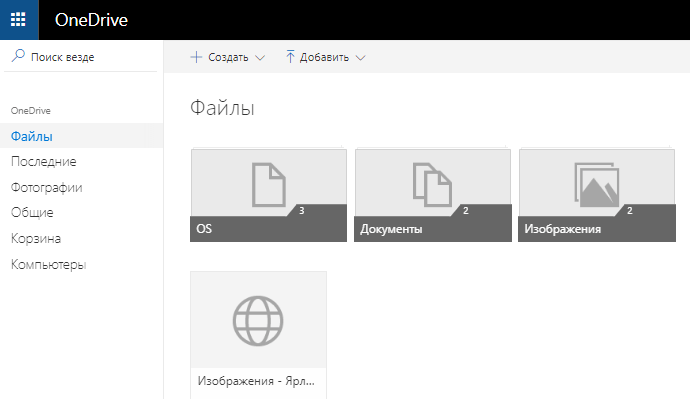
— cloud service data storage that needs no introduction windows users... Still, after all, in the latest releases of this OS (in the "top ten"), it just climbs on top of everything on the screen, as it is set to autostart by default.
For Windows users, the advantage of the Microsoft OneDrive service over its counterparts is perhaps only one thing - it does not need to be installed. You also don't need to create a separate account for it - to enter the cloud, you just need to enter your data account Microsoft.
The owner of one account Microsoft OneDrive provides 5 GB of free disk space to store any information. You will have to pay extra to get additional volume. The maximum is 5 TB and costs 3 399 rubles per year, however, this package includes not only disk space, but also office application 365 (home edition). More affordable tariff plans are 1 TB (2,699 rubles per year - storage and Office 365 personal) and 50 GB (140 rubles per month - only storage).
Additional features of all tariffs:
- Supports other operating systems - Mac OS X, iOS and Android.
- View and edit documents using the built-in Office suite applications.
- Remote access to all content on the computer (not just the OneDrive folders) where the service is installed and uses your Microsoft account.
- Creation of photo albums.
- Built-in messenger (Skype).
- Create and store text notes.
- Search.
Only paid versions:
- Creation of links with a limited duration.
- Offline folders.
- Multi-page scanning with saving documents in a PDF file.
In general, the service is good, but sometimes there are problems with logging into your account. If you are going to work with the web version of the storage (through a browser) and log into it under a different IP address than before, Microsoft sometimes triggers a verification of your account ownership, which is quite time consuming.
There have also been complaints about the removal of user-generated content from OneDrive - when Microsoft suspected it was counterfeit.
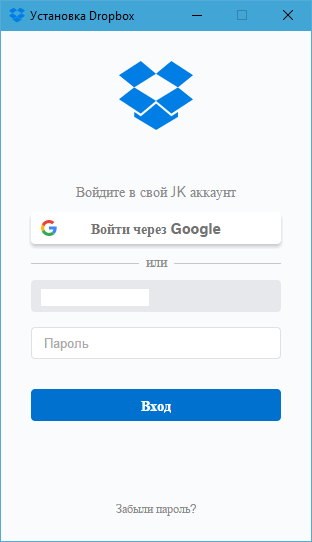
Is one of the oldest cross-platform cloud storage. Unlike the previous one, it supports all major operating systems, as well as some rarely used ones, such as Symbian and MeeGo. The service is very easy to use, fast and stable.
For free, a DropBox user is provided with only 2 GB of disk space for storing personal files, but this amount can be doubled by creating and attaching another one to his account - a work one (which can actually be personal). Together this will make 4 GB.
Switching between personal and working disk space on the DropBox website and in the application is carried out without logging out of your account (you do not need to enter your username and password each time). A separate folder is created on the computer for both accounts - 2 GB each.
DropBox, as expected, also has several tariff plans... Free was mentioned above, Paid is "Plus" (1 TB, $ 8.25 per month, intended for personal use), Standard (2TB, $ 12.50 per month, for business), Advanced (unlimited, $ 20 per month per user) and Enterprise (unlimited, custom pricing). The difference between the latter two lies in the set of additional options.
In addition to storage, free users have access to:
- Service working together with DropBox Paper docs.
- The ability to share links and create shared folders.
- File change log with the ability to restore them to previous version (up to 30 days).
- Commenting on files - both your own and other users, if the file is available for viewing.
- Search function.
- Receive notifications about events (individually configured).
- Automatic loading photos from the camera (by the way, for enabling this option some time ago, DropBox provided users with additional space).
- Choice of full or selective synchronization.
- Data encryption during storage and transmission.
The possibilities of paid tariffs can be listed for a very long time, so we will only note the main ones:
- Remotely wipe data from DropBox on a lost or stolen device.
- Link expiration date.
- Two-factor account authentication.
- Setting access levels to different data.
- Enhanced protection of information class HIPAA / HITECH ( safe storage medical documentation).
- 24/7 technical support.
DropBox is, if not the best, then a very decent service. Despite the small volume of free space by today's standards, it is used by millions of people around the world.
Mega (Megasynk)
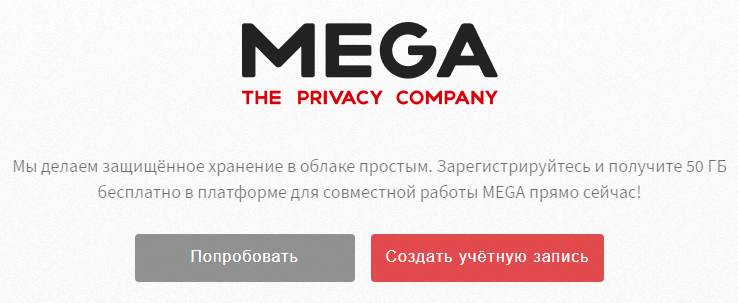
As is clear from the description, Amazon Web Services is focused only on the corporate sector and is not intended to store albums with photos of cats, although it is possible that someone uses it for this too. After all, cloud storage of files - Amazon Glacier, like Yandex disk, provides users with 10 free GB. Additional storage costs $ 0.004 per GB per month.
Comparing Amazon Glacier with the web resources described above is perhaps incorrect, since they have slightly different purposes. The functionality and capabilities of this service are determined by business objectives, including:
- Uninterrupted operation, increased reliability.
- Compliance with enhanced data protection standards.
- Multilingual interface.
- Unlimited volume (additional charge extension).
- Ease of use and flexibility of settings.
- Integration with other Amazon Web Services.
Those interested in Amazon's capabilities can view the complete AWS product documentation on the official website.
Mail.ru
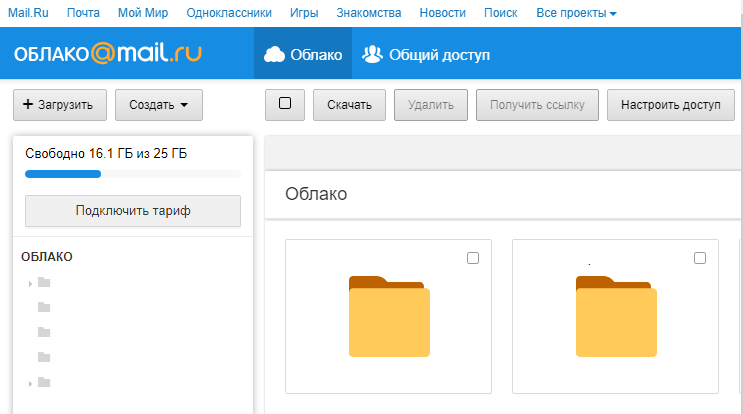
It takes the second or third place in the popularity rating of web file storage among the Russian-speaking audience. In terms of the set of features, it is comparable to Google Drive and Yandex Disk: it, like them, contains web applications for creating and editing documents (texts, tables, presentations) and a screenshotter (a utility for taking screenshots). It is also integrated with other Mail.ru projects - mail, social networks "My World" and "Odnoklassniki", the service "Mail. Dating ”, etc., has a convenient file viewer with a flash player and is also quite affordable (for those who do not have enough allocated space).
The free disk space of the Mail cloud is 8 GB (previously, this figure has changed several times). The premium rate for 64 GB costs 690 rubles per year. For 128 GB you will have to pay 1,490 rubles a year, for 256 GB - 2,290 rubles a year. The maximum volume is 512 GB, it will cost 3,790 rubles per year.
Other functions of the service are not much different from similar ones. It:
- Shared folders.
- Synchronization.
- Built-in search.
- The ability to share links.
The Mail.ru client application runs on Windows, OS X, iOS and Android.
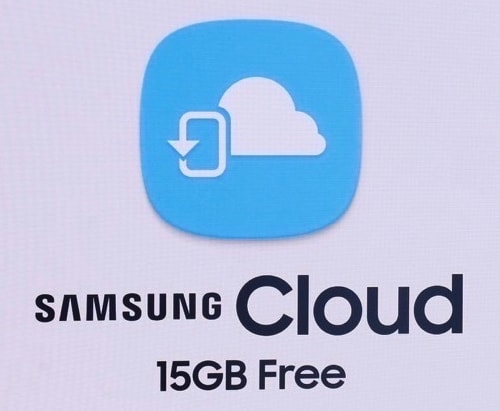
Cloud storage is a proprietary web service for owners of smartphones and tablets from the same manufacturer. Designed for storage backups data from mobile devices - multimedia content, OS files and other things at the discretion of the user.
The Samsung Cloud client application is pre-installed on phones and tablets released after the second half of 2016 (more precisely, after the release Samsung Galaxy Note 7). Registering an account on the service is possible only through it, apparently, to filter out strangers.
Free storage is 15 GB. An additional 50 GB costs $ 0.99 per month, and 200 GB costs $ 2.99.
iCloud (Apple)

- a favorite among cloud data storage users of Apple products. Indeed, it is free (though not very roomy) and is integrated with other apple services. The service is designed to store backup copies of data from iPhone, iPad and iPod, as well as user media files, mail and documents (the latter are automatically synchronized with the contents of iCloud Drive).
Free iCloud storage capacity is 5GB. Additional storage is priced at $ 0.99 for 50GB, $ 2.99 for 200GB, and $ 9.99 for 2TB.
The iCloud client application supports operating mac systems OS X, iOS and Windows. Official app for Android has not been developed, but owners of devices based on this OS can view mail from the Apple cloud on their device.
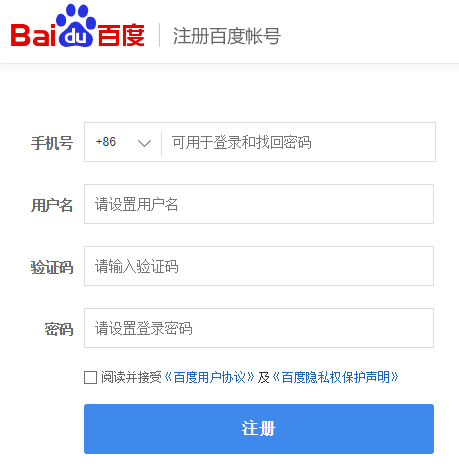
Chinese service completes the top parade of cloud storage. As you can see from the screenshot, it is clearly not adapted for us. Why is it needed then, if there are Russian, European and American analogues that are more familiar to a Russian-speaking person? The point is that Baidu gives users a terabyte of free disk space. For this, it is worth overcoming translation difficulties and other obstacles.
Signing up for Baidu Cloud is significantly more time consuming than the competition. It requires confirmation with a code sent by SMS, and no SMS from a Chinese server arrives at Russian, Belarusian and Ukrainian numbers. Our fellow citizens have to get out by renting a virtual phone number, but that's not all. The second difficulty is that the account cannot be registered to some email addresses. In particular, on services gmail (Google is blocked in China), fastmail and Yandex. And the third difficulty is the need to install the Baidu Cloud mobile application on a phone or tablet, since this is exactly what 1 TB is given (when registering on a computer, you will receive only 5 GB). And it, as you know, is completely in Chinese.
Not scared? Go for it and you will be rewarded. Information on how to create an account on Baidu with your own hands is on the Internet.
MAIN CHOICE | Overview - Where to store files on the network?Choosing a file storage on the network is similar to choosing a bank in real life. Having given your money to the obscure, dubious "Kukareku-bank", it is likely that you will no longer see either the office that the bank rented or the money. Therefore, it is worth choosing projects with a good reputation!
Beginners should be reminded that cloud storage require user to have email... Get yourself a free mailbox on any popular website.
∴ Free Cloud Storage Services (June 2017)
======================================== ============
♦ Microsoft OneDrive
https://onedrive.live.com/
The deal: 5GB of free cloud storage
Formerly known as SkyDrive, OneDrive is an online repository from Microsoft... After free registration you get 5 GB free space on server.

Downloading for Windows application OneDriveSetup.exe (19 MB), you can use the services of synchronization and sharing of folders for several people.

OneDrive - an online storage that you can access from anywhere. You can easily save office documents and other files in the cloud and open them on any device.
Via OneDrive you can share documents, photos and other files without sending bulky email attachments. Also, with files OneDrive easy to work in Windows and on the computer Mac.

Use OneDrive on your phone or tablet to work with files on the go. Available for iOS, Android and Windows Phone
.
♦ Box
https://box.com/

Veteran of file hosting, on the market for over 10 years. A decent offer of ten free gigabytes is not complete without a disgusting fly in the ointment: you cannot upload a file weighing more than 250 MB.

What is interesting Box.com? A successful name from a marketing point of view and draconian conditions for uploading files give confidence in the solid future of this project. They won't let him bend. Files can be stored here safely, without fear of the untimely death of the service.
♦ MediaFire
https://www.mediafire.com/
The deal: 10GB of free cloud storage

Average upload and download speed, in a word - a workhorse. The main dish is 10 free gigabytes - fulfills honestly. Sharing desired file happens with one click of the mouse. There is an application for iOS and Android.
Free version MediaFire allows you to upload files up to 4 GB in size.

From the side of the one who shakes, not everything is so rosy. On one of the forums posted a magazine binder in the form of a link to a folder MediaFire... I could not find a way to download the entire folder: the site requires Upgrade (a hint of money - switching to a premium account). You download one file at a time and curse everything in the world, struggling with frantic ad windows (the plugin makes life a little easier Adblock in the browser).
♦ Gavitex
https://gavitex.com/

A free cloud service makes a mixed impression. It would seem that, having logged into the site, I successfully uploaded 15 GB of my files to the virtual storage, but firstly, the process turned out to be very slow, and secondly, the current upload status was not displayed. The user is forced to "wait for the weather by the sea" in thought, but did it hang? Gavitex offers to download the application - for Windows, Mac, iOs, Android. Maybe everything is different here? Alas, it is difficult to verify this - the downloaded installer refused to connect to the server: "error".

Nonetheless, 25 free gigabytes - the thing is pretty nice. A serious argument from Gavitex! I was pleased with the convenient function of generating public links: by clicking on the stylized "corner" near the desired file, the menu is called Download links... Everything is clear and simple.
I wondered what kind of open lock near the files? After pressing, the lock closes and an inscription appears: Protect file... Well, let's take my word for it that the file is protected.
Correcting childhood mistakes, the main problem of the little-known Gavitex will remain in the brand itself. You are sure that Gavitex will exist in 2-3 years? I'm not at all sure. For storing valuable files - personal photo and video archives, documents - the service is not suitable, only as an "alternate airfield".
♦ pCloud
https://www.pcloud.com/ru/
The deal: 10GB of free cloud storage

This cloud storage service works like this: download the desktop application pCloud_Windows_3.5.6.exe (8 MB), install, run. pCloud Drive creates a virtual partition that Windows refers to Devices with removable media, i.e. recognizes as a regular flash drive.

It is so convenient to use this inconspicuous application that it is impossible to resist admiration. IN Windows 7 64-bit it eats from 18 to 135 MB random access memory... Installation is also possible on Mac and Linux, a plus mobile app for iOS / Android devices.

Working with files is the same as when using a computer on a daily basis. When high speed Internet, you can generally forget that a flash drive is not simple, but virtual. Section "P" now all the time in Windows and, of course, does not disappear anywhere and does not require a connection the next time the computer starts. You can work with him at least in Total Commander, but it must be admitted that the usual windows are more informative Windows.

The desktop application (launched by a shortcut on the desktop) also has tabs Sync and Sharesresponsible for the so-called. sync folders and public links to your files, respectively.
Logging in to the site pCloud, we find a typical web interface: in the section Browse your folders (i.e. you can upload files here as well), section Basket, in which deleted files free account are kept for 24 hours. If there is not enough space in the cloud for the user, you can switch to a premium account.

rules pCloud state that if an account is inactive for more than 1 year, it is closed and the files are permanently deleted.
♦ Syncplicity
https://www.syncplicity.com/
The deal: 10GB of free cloud storage
![]()
Many of our competitors have the function synchronization ("backup", "mirror", "backup"), but there are also specialized Internet services. Their main task is not to save space on your hard drive, but to duplicate folders selected by the user to the server.

Thus, valuable files are stored in two places at once: in your computer and in the cloud, which ensures their reliable safety.

These services include a wonderful Syncplicity... By downloading the client Syncplicity_Setup.exe (8 MB) and installing it, we get a convenient tray icon (in the lower right corner of the screen). By default, the service allocates a folder at My Computer / Favorites / Syncplicity - everything that is thrown there will be duplicated in the online cloud.

I recently made a service iDrive - also an interesting solid project, which specializes in backup.
♦ hubiC
https://hubic.com/
The deal: 25GB of free cloud storage

"25 GB on the road does not lie!" - I said to myself and rushed to create a free account on hubiC... File and folder management is very simple, you can hardly get confused in basic English phrases "Download - Other Actions - New Folder - Add Files" ("Download - More Actions - new folder - Add files ").

To create a public link, click the "corner" next to the desired file. By the decision of the creators hubiC link lifetime is limited to maximum 30 days.
The upload speed to the file storage is quite average, in any case there are not enough stars from the sky.
hubiC - calm, restrained, unperturbed web portal with an excellent offer 25 free gigabytes virtual space. Deservedly falls into the top ten cloud data storage.
♦ Ulozto
https://ulozto.net/
The deal: unlimited space (free)

An unusual participant in our review. At first sight, Ulozto looks like a typical commercial file sharing service. Soon you notice gratifying things: after free registration a paid account is not forcibly imposed, the upload speed is above average, the download speed is acceptable, and, finally, the most attractive is unlimited space for your files, including large ones (3 GB video is uploaded without problems). This stunning "feature", highlighting Ulozto from the gray mass of exchangers, makes you pay close attention to it.
Files can be split into private and public... Marked as private (For me only), files will not show up in general search web portal.
How much secure storage files on Ulozto? The exact information could not be found, however, "eternal storage" is meant. My files have been on the server for six months now, no threats or warnings from Ulozto does not arrive.

Unlimited file space is a challenging and ambitious task for the company that created Ulozto... At the address in Facebook it can be seen that it has Czech roots.
According to the latest IBM blog post, people and even entire businesses are spending less and less money on expensive storage equipment.
Instead, they host files and applications on cloud storage.
Many users are faced with the problem of choosing this very cloud storage. So, you should take care of choosing a service provider that offers the maximum amount of space, low cost and a high level of protection for your data.
Here's my roundup of the top five cloud storage systems of 2017. Each of them offers a free trial period, that is, you can try to use the system for free before giving your hard-earned money for the services.
Cloud storage veteran Dropbox offers a rather paltry 2GB of storage, which can be expanded to 16GB for free by linking your Dropbox to social networks and inviting friends to join the service.
Dropbox Business allows users to collaborate and gives everyone unlimited space, which can be accessed through their personal Dropbox account. The system also offers advanced features for file recovery and version control.
- Price: Free 2GB, 1TB for $ 9.99 per month
Google Drive is the choice of Android device owners, as this system is already integrated into the OS, but users of other platforms can also use it. You can store high-resolution photos on your mobile phone with the Google Photos app, and use Google's own office suite (now known as G Suite).
Cons: The web interface is not very user-friendly, although Windows and Mac users can download special application, which will simplify the work with the cloud.
- Price: 15 GB free, 100 GB for $ 1.99 per month, 1 TB for $ 9.99 per month.
Mega
With insanely generous terms and conditions and a simple interface, Mega is one of the heavyweights in the cloud. Thus, the system offers a convenient mobile application that allows you to upload files and photos, as well as clients for synchronization with desktop devices.
Mega claims that all data stored in the cloud is first encrypted on your device and then sent to the firm's server.
- Price: 50 GB free, 200 GB for € 4.99 per month
Onedrive (formerly SkyDrive) integrates into Windows 10 File Explorer. You don't have to download an additional application - it is already installed by default, which will certainly appeal to those who have already installed the latest operating system from Microsoft.
Microsoft's Photos app can also use Onedrive to sync photos between all of your devices. Thus, the system offers applications for
The era of disks and floppy disks is over. Physical flash drives are dying. Cloud storage is gradually becoming a new trend in the field of user data storage. While the basic idea is the same for everyone, the functionality and approach are vastly different.
Today in the world there are more than 50 companies ready to provide everyone with a "place in the clouds". But how to choose the only one that can satisfy even the most sophisticated needs high level? You need to proceed solely from your own tasks, but our today's review will help you choose a service suitable for these tasks.
Storage overview
Usually, reviews like this come down to who has more free GB, but that's silly and not very professional. Not everyone stores terabytes of data, just as not everyone dreams of encrypting it. Therefore, I will try to move away from the age-old tradition of would-be surveyors and give more detailed information, both about the services themselves and about the additional opportunities that they provide.
Dropbox
Cloud service Dropbox is the favorite in the world of modern cloud technologies. Reliable and lightweight, does not require specific knowledge to configure itself.

Moderately secure, ideal for sharing files and documents. There is only 2GB free, which can be expanded to 1TB for $ 99 per year. Files are accessed from Windows, Linux (Ubuntu, Debian, Fedora), Mac OS, Android, iOS, Kindle Fire and BlackBerry platforms.
Main characteristics
- Is free: 2 GB
- Free extension: up to 28 GB
- Paid: 1 TB
- Price: $ 10 / month
- Platforms: Windows, Linux, Mac OS, Android, iOS, Kindle Fire, BlackBerry
- No
- Encryption: Secure Sockets Layer (SSL) and 256-bit AES
- Additional services: no
Mega
Mega cloud service is lightweight, convenient and ultra-secure, using continuous cryptographic encryption data.
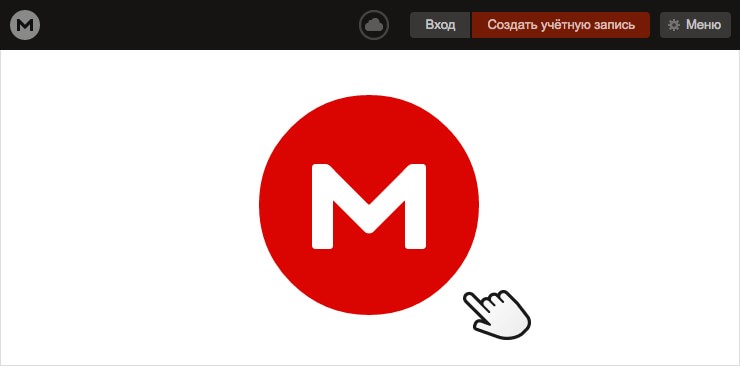
As part of a free account, you can use 50 GB of free space, which can be easily expanded to 500 GB (99 € / year), 2TB (199 € / year), or 4 TB (299 € / year). In addition to popular platforms, Windows, Mac OS, Linux, iOS, Android, Windows Phone and Blackberry, access to your account is possible through special plugins for Chrome and Firefox
- Is free: 50 GB
- Free extension: no
- Paid: up to 4 TB
- Price: from 99 € / year
- Platforms: Windows, Linux, Mac OS, Android, iOS, Windows Phone, BlackBerry, as well as Chrome and Firefox plugins
- Single file upload limitation: no
- Encryption: 256-bit AES
- Additional services: Browser, email and chat
By the way, Mega is one of the ten best services for novice web designers according to Onjee. You can find the rest of the tools here.
Google drive
The Google Drive cloud service is part of a huge ecosystem of good corporation. Registration is not required if you are an active user of Gmail, Youtube, or Google+.

A huge advantage of the service is its close integration with a set of office google applications Docs, which has become great for many alternative to Microsoft Office. Free account includes 15 GB of free space with the possibility of paid expansion up to 30 TB. In addition to the web interface, applications for Windows, Mac OS, Android and iOS platforms are available for download.
- Is free: 15 GB
- Free extension: no
- Paid: up to 30 TB
- Price: from 2 $ / month
- Platforms: Windows, Mac OS, Android, iOS
- Single file upload limitation: 5 TB
- Encryption: 128-bit AES
- Additional services: All Google services
Yandex.Disk
The Yandex.Disk cloud service is an excellent alternative to Google Drive, though without the possibility of using its office applications. But the bundle comes with an excellent photo editor and tight integration with social networks.

For free use, 10 GB is allocated, with the possibility of expanding to 1 TB for 900 rubles / month. A web interface and several applications for Windows, Linux, Mac OS, Android, iOS and Windows Phone are available for working with the disk.
- Is free: 10 GB
- Free extension: up to 20 GB
- Paid: up to 1 TB
- Price: from 30 rubles / month
- Platforms:
- Single file upload limitation: 10 GB
- Encryption: According to some reports, no
- Additional services: Photo editor
Cloud service Mail.Ru is an ordinary file storage, with a wet attempt at Google Drive. It only makes sense to use it if you have access to other Mail services.
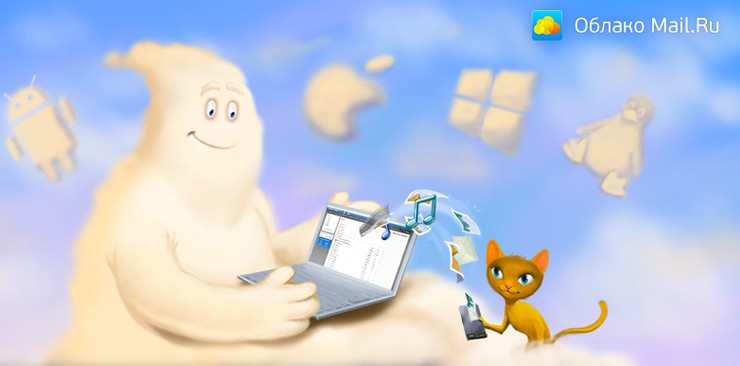
After the exclusive rights scandal for downloadable content, I would be afraid to use the Cloud to store sensitive and confidential data. Nevertheless, if you think about it, there is quite a decent use for the free 25 Gigabytes.
- Is free: 25 GB
- Free extension: No
- Paid: up to 1 TB
- Price: from 99 rubles / month
- Platforms: Windows, Linux, Mac OS, Android, iOS, Windows Phone
- Single file upload limitation: from 2 GB
- Encryption: No
- Additional services: Documents
Cloud service OneDrive - the brainchild of Microsoft, outwardly very similar to Dropbox, tightly integrated into the operating room windows system 8+.
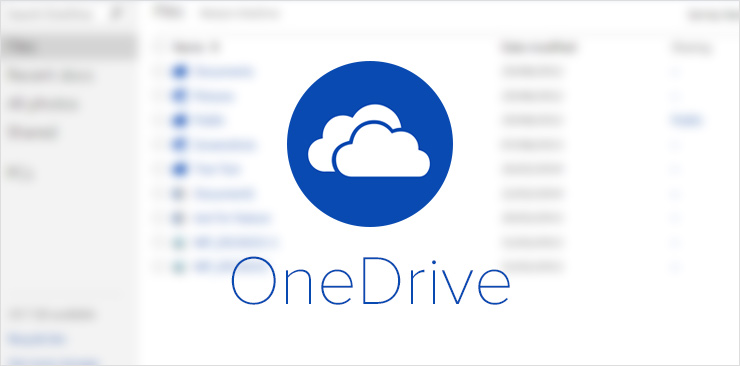
Microsoft is building its own ecosystem, so an account on any of the company's services is enough to start using OneDrive, including an Xbox Live account. Free users can download files within 15 GB, while Office 365 owners are not limited by the framework. It is possible to expand a free account up to 1 TB for 200 rubles / month. The account is accessed through the Windows, Windows Phone, Mac OS, Android, iOS and Xbox platforms.
- Is free: 15 GB
- Free extension: No
- Paid: up to 1 TB
- Price: from 72 rubles / month
- Platforms: Windows, Windows Phone, Mac OS, Android, iOS, Xbox
- Single file upload limitation: from 10 GB
- Encryption: Perfect Forward Secrecy (PFS)
- Additional services: Office 365
Finally
I want to note that this review cloud storage does not imply the choice of one of them. It is much more expedient to use several services together. For example: Mega for backup, Drive for documents and spreadsheets, and Dropbox for more corporate purposes. But which chain of services to choose is up to you.
